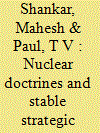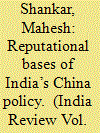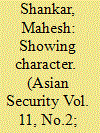|
|
|
Sort Order |
|
|
|
Items / Page
|
|
|
|
|
|
|
| Srl | Item |
| 1 |
ID:
143933


|
|
|
|
|
| Summary/Abstract |
As the dispute over Kashmir broke out in 1947, a plebiscite of the people of the state offered a mutually acceptable and ostensibly fair path out of the imbroglio. Critics have often laid the blame on Nehru, and the territory’s salience to India, for why a plebiscite was never held. Based on primary documentation, this article makes the case that it was not a lack of commitment to the formula, but rather Nehru’s deeply held strategic and reputational fears that motivated, first, the setting of what Delhi saw as firm but fair pre-conditions, and after the conclusion of the US-Pakistan military pact in 1954, the complete rejection of the plebiscite option.
|
|
|
|
|
|
|
|
|
|
|
|
|
|
|
|
| 2 |
ID:
145262


|
|
|
|
|
| Summary/Abstract |
This article offers a discussion of nuclear doctrines and their significance for war, peace and stability between nuclear-armed states. The cases of India and Pakistan are analysed to show the challenges these states have faced in articulating and implementing a proper nuclear doctrine, and the implications of this for nuclear stability in the region. We argue that both the Indian and Pakistani doctrines and postures are problematic from a regional security perspective because they are either ambiguous about how to address crucial deterrence related issues, and/or demonstrate a severe mismatch between the security problems and goals they are designed to deal with, and the doctrines that conceptualize and operationalize the role of nuclear weapons in grand strategy. Consequently, as both India's and Pakistan's nuclear doctrines and postures evolve, the risks of a spiralling nuclear arms race in the subcontinent are likely to increase without a reassessment of doctrinal issues in New Delhi and Islamabad. A case is made for more clarity and less ambition from both sides in reconceptualizing their nuclear doctrines. We conclude, however, that owing to the contrasting barriers to doctrinal reorientation in each country, the likelihood of such changes being made—and the ease with which they can be made—is greater in India than in Pakistan.
|
|
|
|
|
|
|
|
|
|
|
|
|
|
|
|
| 3 |
ID:
170897


|
|
|
|
|
| Summary/Abstract |
This paper analyzes instances of the Indian leadership’s choice of an escalatory approach in its border dispute with China, first in the adoption of the Forward Policy in the lead up to the 1962 war, and more briefly the more recent decision in 2017 to take escalatory action in response to Chinese activity in the Doklam area in the trijunction of the India-China-Bhutan border region. In doing so, the paper demonstrates how a focus on reputation as an explanatory factor may allow us to make better sense of how Indian leaders have in the past and continue to in the present make decisions on key issues of national security concern.
|
|
|
|
|
|
|
|
|
|
|
|
|
|
|
|
| 4 |
ID:
140772


|
|
|
|
|
| Summary/Abstract |
In the approach to the Sino-Indian war of 1962, the Indian government made some surprising policy choices. Most significant was Nehru’s decision to contest what was viewed by him and his officials as unimportant territory in the western sector, rejecting in the process Chou en-Lai’s 1960 “package” offer. Instead, Delhi chose to initiate in 1961 the Forward Policy, in full awareness of the severely disadvantageous position of the Indian military in the disputed border areas. Using Indian primary documents, this article makes the case that reputational considerations—particularly Nehru’s fear that any concessions to China would be viewed as weakness and provoke further aggression—help explain the puzzling aspects of India’s intransigence on the Sino-Indian territorial dispute during this period.
|
|
|
|
|
|
|
|
|
|
|
|
|
|
|
|
| 5 |
ID:
079997


|
|
|
|
|
|
|
|